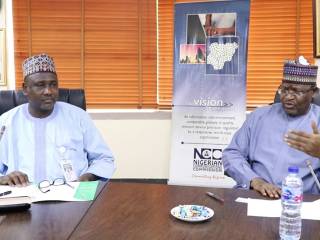The Executive Vice Chairman (EVC) of the Nigerian Communications Commission (NCC), Prof. Umar Danbatta has said the Commission is committed to collaborating with the Nigerian Environmental Standards and Regulatory Enforcement Agency (NESREA) to ensure a cleaner environment in Nigeria.
Danbatta stated this on Wednesday, September 4, 2019, when the top Management of NESREA paid a courtesy visit to NCC to seek better understanding of NCC's initiative on electronic waste management and other issues of common interest to both agencies. The NESREA delegation was led by the Agency's Director General, Prof Aliyu Jauro.
Prof. Jauro told Danbatta that NESREA, set up in 2007, is mandated to enforce the nation's environmental laws and regulations, including those relating to technological products that are harmful to humans and the environment. Jauro said Nigeria has a regulation on electronic materials since 2011 - the first African country to institute a regulation on electronic waste. He therefore seeks NCC's cooperation in enforcing the regulation.
Explicating on the extent of collaboration NESREA seeks with NCC, Jauro said he looked forward to the harmonisation of NCC's initiative on e-waste with the NESREA regulation on the same subject, partnership for the enforcement of environmental laws and regulations relating to telecoms, as well as compliance of telecom operators with the 10 metres setback distance for the location of Base Transmission Stations (BTS).
In his response, Danbatta thanked Jauro and his team for the visit and assured him of NCC cooperation all the way. He said a classical case of fruitful collaboration happened between the two organisations with the agreement on 10 metres setback distance for telecom masts. The EVC explained that the Commission's initiative on e-waste was informed by its concern for the rise in tempo of disposal of electronic waste in the country. He noted that such waste which include used and substandard handsets are not biodegradable and needed to be systematically managed to ensure their harmful components such as radioactive materials do not endanger humans and the environment.
It was this concern that made NCC to rally telecom sector stakeholders to institute the process of delivering a sector-specific regulation which both organisations agreed is not at variance with the 2011 regulations of NESREA nor conceived to interlope with the powers of NESREA.Accordingly, both NCC and NESREA agreed to set up a working group to explore how NESREA can accommodate in its electronic regulation the emergent issues that NCC seeks to address in the e-waste regulation focusing on telecommunication issues.
Professors Danbatta and Jauro are confident that based on the renewed relationship and collaboration, compliance and enforcement processes with respect to implementation of setback distance for telecom masts will henceforth be carried out in manners that will not cause any disruptions to telecommunication services.
Both NCC and NESREA also agreed to collaborate to enhance Nigeria's desire to join the circular economy.
A circular economy, unlike a linear one, is an economy that has no waste as various types of waste are cleaned and recycled.

